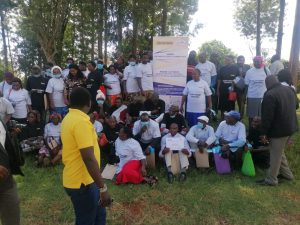Project II: Adapting to Universal Health Coverage (UHC)
Overview:
In 2018, the Kenyan government declared Universal Health Coverage (UHC) as one of its four main agenda items, aiming for achievement by 2022. This declaration significantly altered the context and operating environment for the Community-Based Health Insurance (CBHI) project.
Pilot Program in Nyeri County:
UHC Implementation: Nyeri County, one of the CBHI project’s operational sites, was chosen as one of four pilot counties for UHC. The adopted model provided free health services at all public hospitals within the county.
Resource Allocation: Substantial financial and non-financial resources were mobilized to support this initiative.
Challenges: The promise of free services attracted citizens from within and neighboring counties, leading to congestion due to inadequate infrastructure and workforce. This hindered the model from achieving the desired results.
Pilot Outcome: The pilot ended in early 2020, leaving a disillusioned citizenry, with a reported 40% abandoning their CBHI/NHIF covers.
Current Focus
Leveraging past experiences, institutional structures, and social capital, the project has shifted its focus to:
1. Lobbying and Advocacy: Promoting lobby and advocacy work combined with social accountability approaches in health service delivery to sustain the UHC agenda and constitutional commitments.
2. Citizen-Centered Approach: Emphasizing a more citizen-centered approach in county government planning and budgeting for health.
3. Monitoring UHC Rollout: Ensuring citizen participation in governance, particularly in the budgetary process and decision-making, to ensure a quality life for all.
Key Strategies
Social Accountability: Implementing social accountability approaches to enhance transparency and effectiveness in health service delivery.
Community Involvement: Encouraging active citizen participation in governance processes, particularly in health-related planning and budgeting.
Sustainable Health Services: Advocating for sustainable health services that align with the UHC agenda and constitutional mandates.
Benefits of Citizen Participation
1. Enhanced Governance: Improved transparency and accountability in health service delivery.
2. Better Resource Allocation: More effective planning and budgeting for health services.
3. Sustainable Health Coverage: Ensuring the UHC agenda is sustained and benefits all citizens.
Conclusion:
The transition to Universal Health Coverage has posed challenges, but by building on past successes and fostering community involvement, the project aims to create a sustainable, citizen-centered health system. This approach ensures that health services are effectively planned, budgeted, and delivered, aligning with the UHC promise and improving the quality of life for all.
